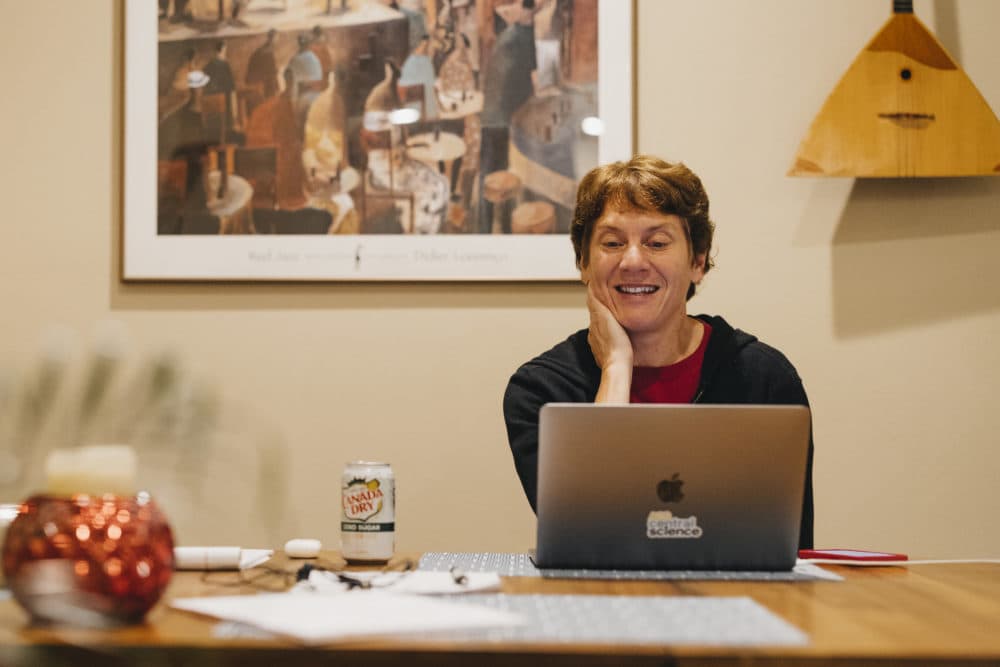Advertisement
Lexington High School, Harvard University graduate wins Nobel Prize in Chemistry

A graduate of Lexington High School and Harvard University has won a Nobel Prize.
Wednesday morning, the Nobel Committee announced that Carolyn Bertozzi will receive the 2022 Nobel Prize in chemistry. She'll share the prize with two other scientists in the field — Morten Meldal of the University of Copenhagen and K. Barry Sharpless, who's affiliated with Scripps Research in California.
Bertozzi grew up in Lexington. She graduated from high school there in 1984 and obtained her undergraduate degree from Harvard in 1988. She's a professor at Stanford University.
She spoke with WBUR's All Things Considered host Lisa Mullins.
Interview Highlights
On whether she had any suspicion she'd get a call from Stockholm early this morning:
"I did know that this was the day for the chemistry Nobel Prize. But for me, it was like any other day. You know, I went to bed and I was sound asleep, and then the phone started buzzing. And eventually it woke me up. And I was a little confused at first, until I looked at the number and realized it was an international number from Sweden. And that's when the impossible suddenly seemed possible. It took me a few minutes to recognize that this was not some strange dream or some hallucination, and that I really did have the chair of the Nobel Committee on the phone, with his colleagues behind him congratulating me on the Nobel Prize. What a shock."
On how she responded:
"I don't think I caught my breath the entire phone call. The whole time, I was pretty speechless. And I think they were somewhat bemused by it, because I'm not known as a speechless person. And they told me, 'OK, well, you have 50 minutes until the live announcement.' And in that period of time, I took it upon myself to make a few phone calls just to my closest inner circle of confidants, which includes my my father. And my dad is 91 years old, and he's a retired physics professor from MIT. And so he understands the gravity of a Nobel Prize and what that means. And he was just so overjoyed, just bursting with pride. And I'm so happy that he is still with us [and] that he could enjoy this moment with me."
On the click chemistry and biorthogonal reactions for which Bertozzi and her colleagues won the Nobel Prize:
"Biorthogonal chemistry is basically chemistry that does not interact with or interfere with anything in a biological setting. And that's a bit of a superpower for a chemical reaction to have, because that means you can actually do these chemical reactions, and take two reagents, and react them to form a bonded product. And you can do that even in living cells.
Advertisement
"We use these reactions to label biological molecules with imaging probes so we can track them around inside living animals and even someday in human patients to diagnose diseases. Other groups are using these chemistries to make new materials.
"So the way I like to think of it is, biorthogonal chemistry kind of kick-started this idea that you could do chemistry in biological settings. And then the click chemistry reaction turned out to have some really magical properties that we leveraged as we were kind of developing the field...
"What I'm really excited about is using biorthogonal click chemistry reactions to build new kinds of medicines that have unprecedented mechanisms of action and that can basically treat diseases that have been previously untreatable."
On winning a Nobel in a male-dominated field:
"I fully understand the gravity of having a woman named as a Nobel laureate in the sciences, because there's just so few. You know, it's hard to know how your gender affects your career, because you can't live a parallel life. But I would like to think that the impact of the chemistry kind of speaks for itself. And, you know, of course, it's incredibly rewarding to see increasing numbers of women enter the sciences, enter academic sciences, rise up to the top of their profession, and then in a few cases, get recognized with a Nobel Prize. Things are trending in the right direction."
On what she would say to young women at Lexington High School or the local library in Lexington — the town where she grew up:
"The interesting thing is, I think if I were in the library with all those Lexington High School students, I would be the listener. And I would be asking them to tell me, 'Where do you want to be in the future, and what's your plan, and what are your ideas?' Because it's the students that are their age that are the dreamers. They're the ones that think about the future. They have so much more of a future than I do at my age. And they're passionate, they're fearless, they're fierce; and they are also a very optimistic generation. They don't see limits on what they can achieve in their futures. So I think I would be learning from them more than they would be learning from me."
This segment aired on October 5, 2022.

